Worksheet - Adjectives | Worksheets with solutions for Class 3 PDF Download
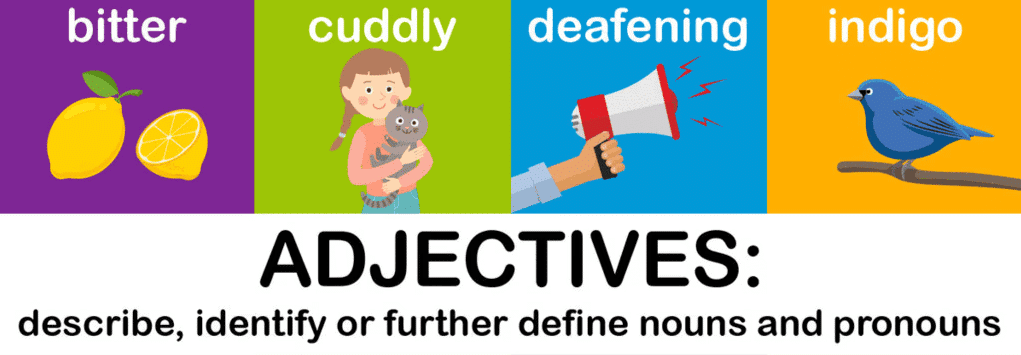 Q.1. Circle the adjectives and underline the nouns they describe. There may be more than one of each!
Q.1. Circle the adjectives and underline the nouns they describe. There may be more than one of each!
Example:
The young boy helped his father to wash the dirty car.
The  boy helped his father to wash the
boy helped his father to wash the car.
car.
1. The pretty girl twirled in her new dress.
2. The clean windows shone in the sunlight.
3. Mary put her blue pencil, her red marker and her sharpener back in her pencil case.
4. The green grass grows under the warm sun of summer.
5. His yellow pajamas were so long that they dragged on the floor.
6. The fluffy pillows covered his small bed.
7. She tied her long, black hair in a ponytail.
8. The nervous cat jumped when the loud children entered the room.
9. Mark rode his new green bicycle to the park.
10. The children danced to the groovy music.
11. Luke organized his numerous toys on the shelf.
Hint: Adjectives are words that describe nouns.
Ans.
1. The  girl twirled in her
girl twirled in her  dress.
dress.
2. The  windows shone in the sunlight.
windows shone in the sunlight.
3. Mary put her pencil, her
pencil, her marker and her sharpener back in her pencil case.
marker and her sharpener back in her pencil case.
4. The  grass grows under the
grass grows under the  sun of summer.
sun of summer.
5. His  pajamas were so
pajamas were so  that they dragged on the floor.
that they dragged on the floor.
6. The pillows covered his small bed.
pillows covered his small bed.
7. She tied her  hair in a ponytail.
hair in a ponytail.
8. The  cat jumped when the
cat jumped when the children entered the room.
children entered the room.
9. Mark rode his  bicycle to the park.
bicycle to the park.
10. The children danced to the music.
music.
11. Luke organized his  toys on the shelf.
toys on the shelf.
Q.2. Circle the adjectives.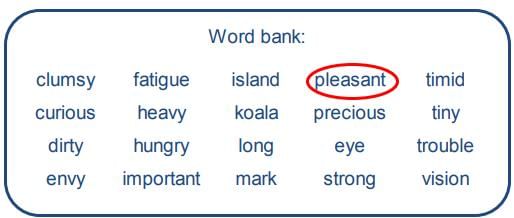
Complete the sentences using the adjectives from above.
Example:
The ______ man helped the woman cross the street.
The pleasant man helped the woman cross the street.
1. The ______ papers were left on the table.
2. Mark was talking with his ______ neighbour.
3. Is it true that a ______ mouse can scare an elephant?
4. Leave your ______ shoes on the mat by the door.
5. The ______ baby was crying for his bottle.
6. The ______ players scored many goals.
7. Lydia left her ______ backpack at the bottom of the stairs.
8. Teddy is so ______ and he tripped on the sidewalk.
9. Jenna placed her ______ doll carefully on her dresser.
10. The students were looking forward to the ______ summer break.
11. The ______ girl refused to sing in front of the crowd.Ans.
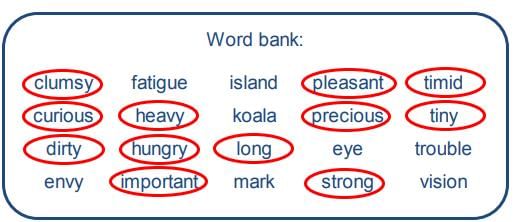
1. The important papers were left on the table.
2. Mark was talking with his curious neighbour.
3. Is it true that a tiny mouse can scare an elephant?
4. Leave your dirty shoes on the mat by the door.
5. The hungry baby was crying for his bottle.
6. The strong players scored many goals.
7. Lydia left her heavy backpack at the bottom of the stairs.
8. Teddy is so clumsy and he tripped on the sidewalk.
9. Jenna placed her precious doll carefully on her dresser.
10. The students were looking forward to the long summer break.
11. The timid girl refused to sing in front of the crowd.
Q.3. Complete the sentences with either ‘fewer’ or ‘less’.
Example:
Paul has _____ cards than Joel.
Paul has fewer cards than Joel.
1. Dad has ______ time to play than me.
2. This recipe takes ______ flour than the other.
3. I will have ______ eggs for breakfast than you.
4. You should have ______ difficulty with this homework.
5. This page has ______ math problems to complete.
6. ______ people came to the fair this year.
7. The crowd was ______ animated than last year.
8. Jody lost ______ teeth than you.
9. The admission costs ______ money than last time.
10. In winter, there are ______ choices of games to play at recess.
11. Thankfully, they are making ______ noise than before.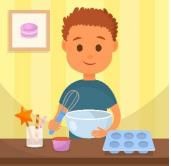
Hint:
Use ‘fewer’ for objects that can be counted.
3 books
Use ‘less’ with nouns that are not countable.
water
Ans.
1. Dad has less time to play than me.
2. This recipe takes less flour than the other.
3. I will have fewer eggs for breakfast than you.
4. You should have less difficulty with this homework.
5. This page has fewer math problems to complete.
6. Fewer people came to the fair this year.
7. The crowd was less animated than last year.
8. Jody lost fewer teeth than you.
9. The admission costs less money than last time.
10. In winter, there are fewer choices of games to play at recess.
11. Thankfully, they are making less noise than before.
Q.4. Complete the chart.
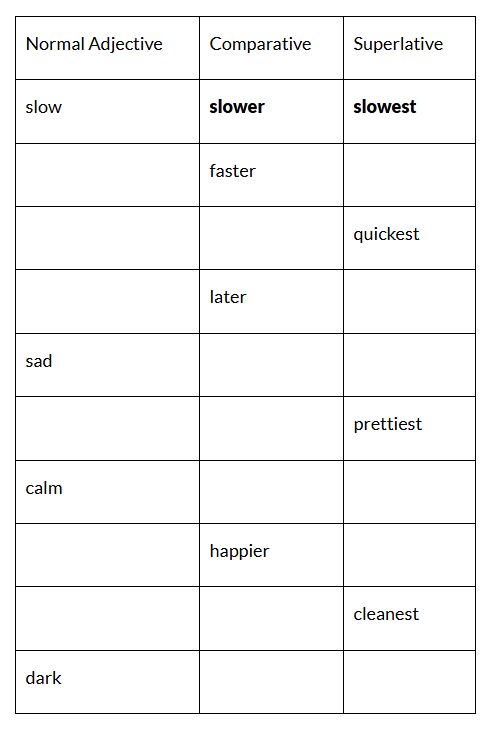
Is the underlined word a normal adjective (“N”), comparative (“C”) or superlative (“S”)?
S 1. Mary is the wisest girl I know.
_______ 2. Karl is tall for his age.
_______ 3. James is lazier than Robert.
_______ 4. Peanuts are cheaper than cashews.
_______ 5. The closet is the fullest it’s ever been.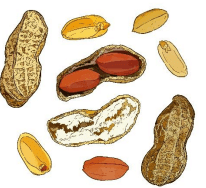 Ans. Choose the correct adjective.
Ans. Choose the correct adjective.
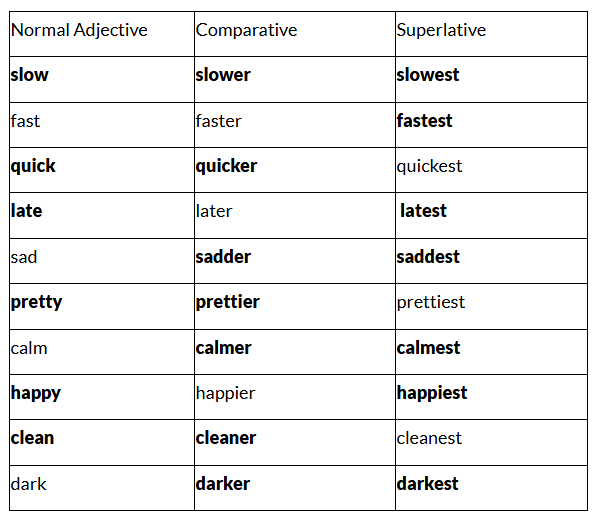
Is the underlined word a normal adjective (“N”), comparative (“C”) or superlative (“S”)?
S 1. Mary is the wisest girl I know.
N 2. Karl is tall for his age.
C 3. James is lazier than Robert.
C 4. Peanuts are cheaper than cashews.
S 5. The closet is the fullest it’s ever been.
FAQs on Worksheet - Adjectives - Worksheets with solutions for Class 3
| 1. What are adjectives? |  |
| 2. How do adjectives make sentences more interesting? |  |
| 3. Can adjectives be used to compare things? |  |
| 4. What is the role of adjectives in storytelling? |  |
| 5. Can you provide some examples of adjectives used in everyday life? |  |

















